Global Business Environment: Theory, Driving Forces, and Impact on Sasol Limited
VerifiedAdded on 2023/06/05
|14
|4771
|190
AI Summary
This report provides an outline of the globalisation condition and how it affects Sasol Limited's aspirations for the world and its commercial goals. It covers the theory of globalisation, driving forces behind globalisation in business and finance, and the impact of globalisation on Sasol Limited. It also identifies strategic challenges posed by functioning in a wider perspective and provides advice for overcoming obstacles.
Contribute Materials
Your contribution can guide someone’s learning journey. Share your
documents today.
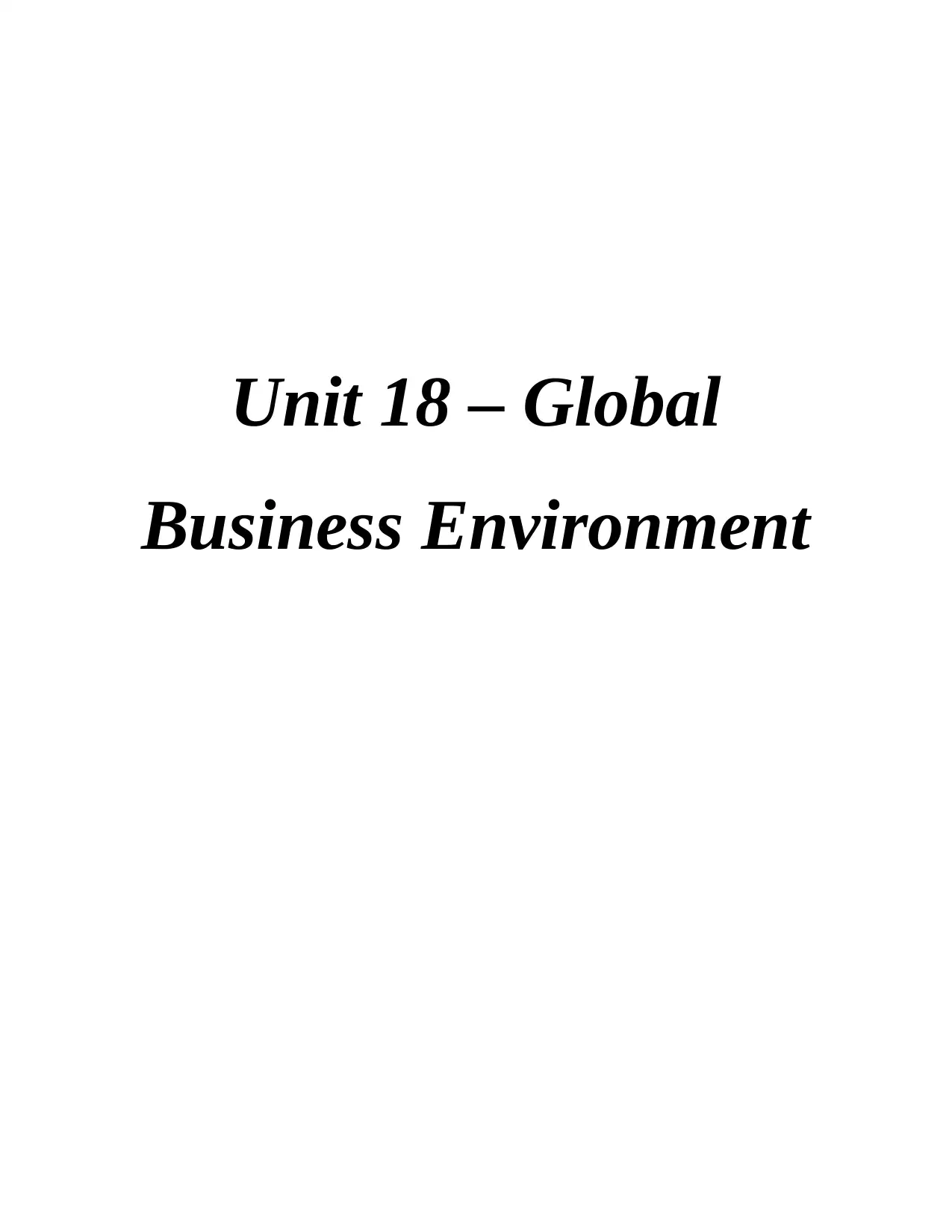
Unit 18 – Global
Business Environment
Business Environment
Secure Best Marks with AI Grader
Need help grading? Try our AI Grader for instant feedback on your assignments.
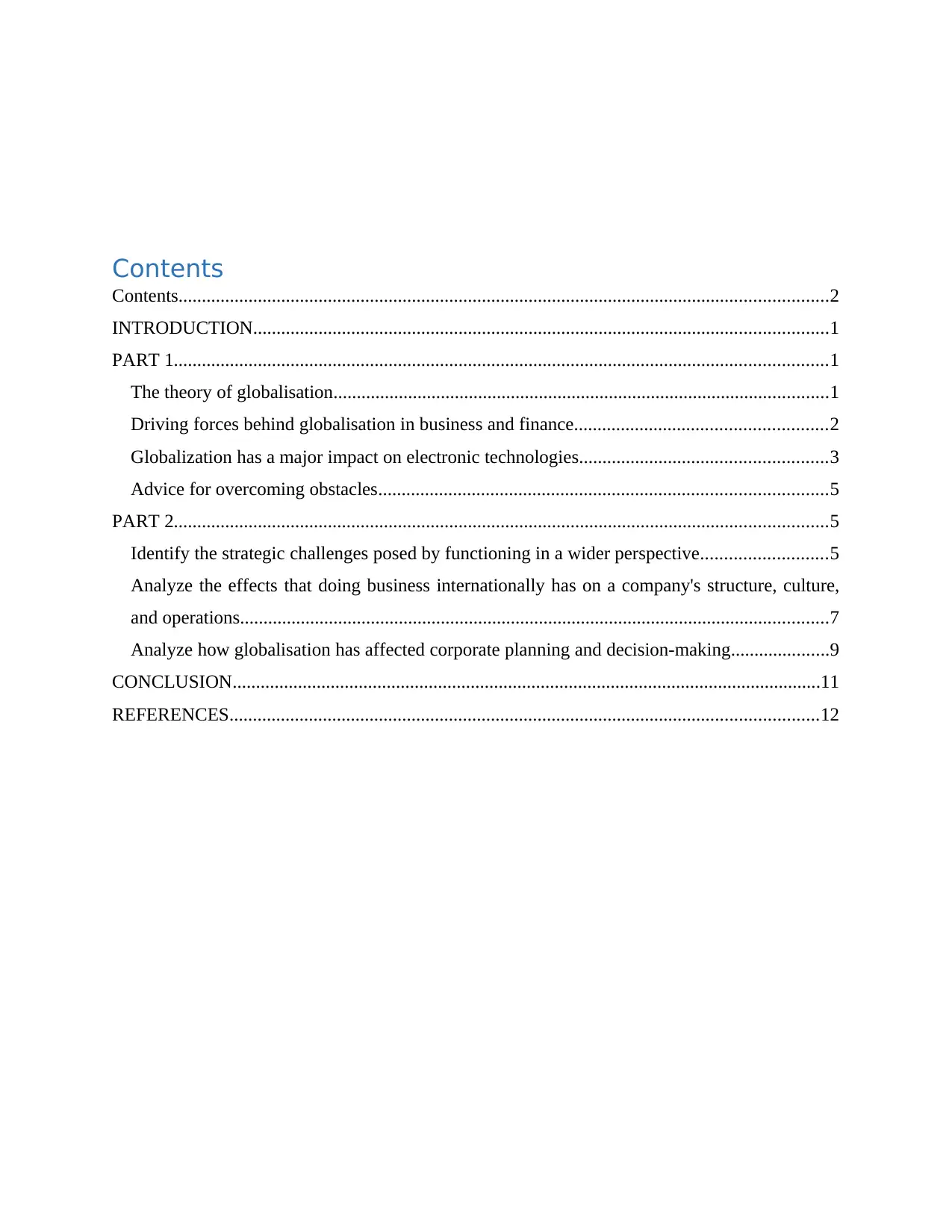
Contents
Contents...........................................................................................................................................2
INTRODUCTION...........................................................................................................................1
PART 1............................................................................................................................................1
The theory of globalisation..........................................................................................................1
Driving forces behind globalisation in business and finance......................................................2
Globalization has a major impact on electronic technologies.....................................................3
Advice for overcoming obstacles................................................................................................5
PART 2............................................................................................................................................5
Identify the strategic challenges posed by functioning in a wider perspective...........................5
Analyze the effects that doing business internationally has on a company's structure, culture,
and operations..............................................................................................................................7
Analyze how globalisation has affected corporate planning and decision-making.....................9
CONCLUSION..............................................................................................................................11
REFERENCES..............................................................................................................................12
Contents...........................................................................................................................................2
INTRODUCTION...........................................................................................................................1
PART 1............................................................................................................................................1
The theory of globalisation..........................................................................................................1
Driving forces behind globalisation in business and finance......................................................2
Globalization has a major impact on electronic technologies.....................................................3
Advice for overcoming obstacles................................................................................................5
PART 2............................................................................................................................................5
Identify the strategic challenges posed by functioning in a wider perspective...........................5
Analyze the effects that doing business internationally has on a company's structure, culture,
and operations..............................................................................................................................7
Analyze how globalisation has affected corporate planning and decision-making.....................9
CONCLUSION..............................................................................................................................11
REFERENCES..............................................................................................................................12
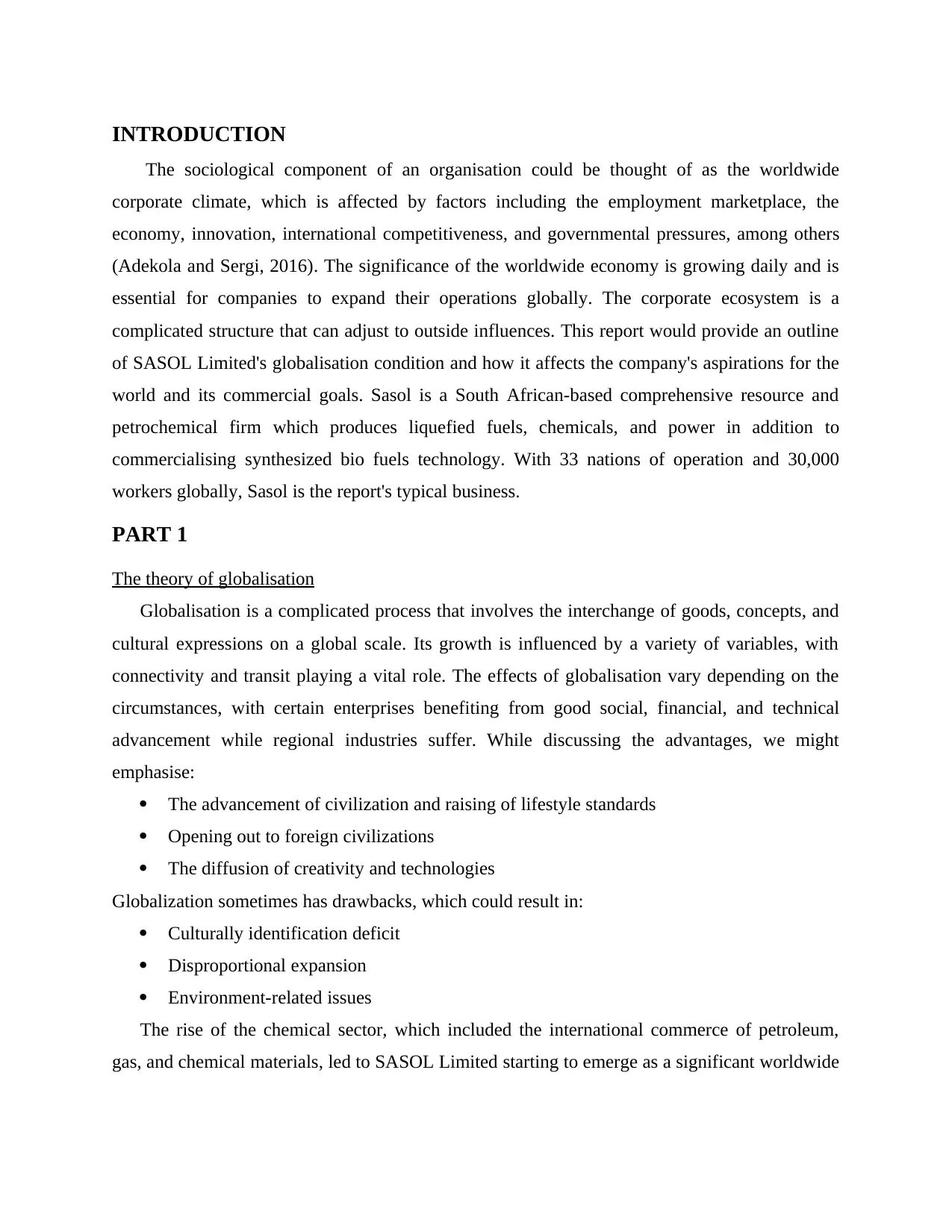
INTRODUCTION
The sociological component of an organisation could be thought of as the worldwide
corporate climate, which is affected by factors including the employment marketplace, the
economy, innovation, international competitiveness, and governmental pressures, among others
(Adekola and Sergi, 2016). The significance of the worldwide economy is growing daily and is
essential for companies to expand their operations globally. The corporate ecosystem is a
complicated structure that can adjust to outside influences. This report would provide an outline
of SASOL Limited's globalisation condition and how it affects the company's aspirations for the
world and its commercial goals. Sasol is a South African-based comprehensive resource and
petrochemical firm which produces liquefied fuels, chemicals, and power in addition to
commercialising synthesized bio fuels technology. With 33 nations of operation and 30,000
workers globally, Sasol is the report's typical business.
PART 1
The theory of globalisation
Globalisation is a complicated process that involves the interchange of goods, concepts, and
cultural expressions on a global scale. Its growth is influenced by a variety of variables, with
connectivity and transit playing a vital role. The effects of globalisation vary depending on the
circumstances, with certain enterprises benefiting from good social, financial, and technical
advancement while regional industries suffer. While discussing the advantages, we might
emphasise:
The advancement of civilization and raising of lifestyle standards
Opening out to foreign civilizations
The diffusion of creativity and technologies
Globalization sometimes has drawbacks, which could result in:
Culturally identification deficit
Disproportional expansion
Environment-related issues
The rise of the chemical sector, which included the international commerce of petroleum,
gas, and chemical materials, led to SASOL Limited starting to emerge as a significant worldwide
The sociological component of an organisation could be thought of as the worldwide
corporate climate, which is affected by factors including the employment marketplace, the
economy, innovation, international competitiveness, and governmental pressures, among others
(Adekola and Sergi, 2016). The significance of the worldwide economy is growing daily and is
essential for companies to expand their operations globally. The corporate ecosystem is a
complicated structure that can adjust to outside influences. This report would provide an outline
of SASOL Limited's globalisation condition and how it affects the company's aspirations for the
world and its commercial goals. Sasol is a South African-based comprehensive resource and
petrochemical firm which produces liquefied fuels, chemicals, and power in addition to
commercialising synthesized bio fuels technology. With 33 nations of operation and 30,000
workers globally, Sasol is the report's typical business.
PART 1
The theory of globalisation
Globalisation is a complicated process that involves the interchange of goods, concepts, and
cultural expressions on a global scale. Its growth is influenced by a variety of variables, with
connectivity and transit playing a vital role. The effects of globalisation vary depending on the
circumstances, with certain enterprises benefiting from good social, financial, and technical
advancement while regional industries suffer. While discussing the advantages, we might
emphasise:
The advancement of civilization and raising of lifestyle standards
Opening out to foreign civilizations
The diffusion of creativity and technologies
Globalization sometimes has drawbacks, which could result in:
Culturally identification deficit
Disproportional expansion
Environment-related issues
The rise of the chemical sector, which included the international commerce of petroleum,
gas, and chemical materials, led to SASOL Limited starting to emerge as a significant worldwide
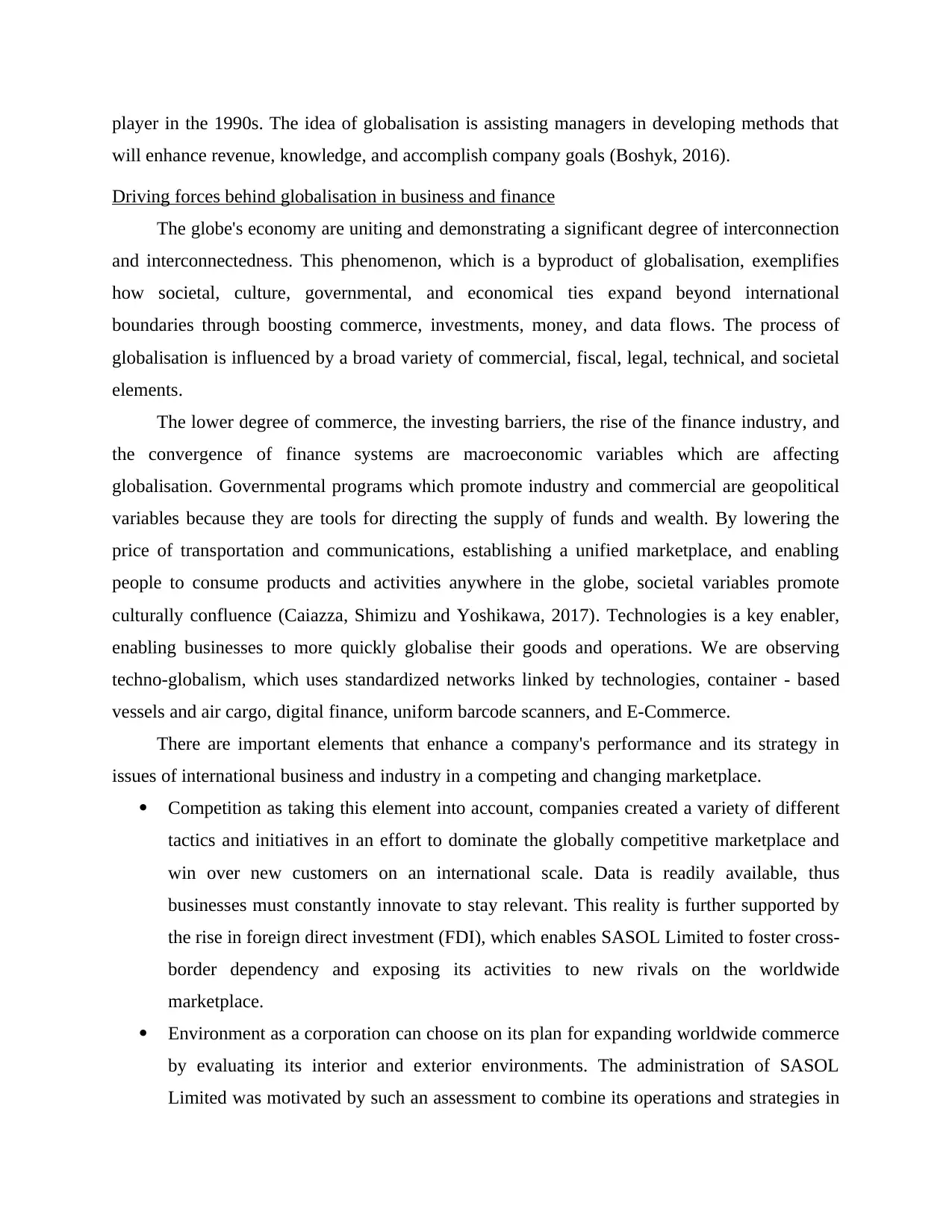
player in the 1990s. The idea of globalisation is assisting managers in developing methods that
will enhance revenue, knowledge, and accomplish company goals (Boshyk, 2016).
Driving forces behind globalisation in business and finance
The globe's economy are uniting and demonstrating a significant degree of interconnection
and interconnectedness. This phenomenon, which is a byproduct of globalisation, exemplifies
how societal, culture, governmental, and economical ties expand beyond international
boundaries through boosting commerce, investments, money, and data flows. The process of
globalisation is influenced by a broad variety of commercial, fiscal, legal, technical, and societal
elements.
The lower degree of commerce, the investing barriers, the rise of the finance industry, and
the convergence of finance systems are macroeconomic variables which are affecting
globalisation. Governmental programs which promote industry and commercial are geopolitical
variables because they are tools for directing the supply of funds and wealth. By lowering the
price of transportation and communications, establishing a unified marketplace, and enabling
people to consume products and activities anywhere in the globe, societal variables promote
culturally confluence (Caiazza, Shimizu and Yoshikawa, 2017). Technologies is a key enabler,
enabling businesses to more quickly globalise their goods and operations. We are observing
techno-globalism, which uses standardized networks linked by technologies, container - based
vessels and air cargo, digital finance, uniform barcode scanners, and E-Commerce.
There are important elements that enhance a company's performance and its strategy in
issues of international business and industry in a competing and changing marketplace.
Competition as taking this element into account, companies created a variety of different
tactics and initiatives in an effort to dominate the globally competitive marketplace and
win over new customers on an international scale. Data is readily available, thus
businesses must constantly innovate to stay relevant. This reality is further supported by
the rise in foreign direct investment (FDI), which enables SASOL Limited to foster cross-
border dependency and exposing its activities to new rivals on the worldwide
marketplace.
Environment as a corporation can choose on its plan for expanding worldwide commerce
by evaluating its interior and exterior environments. The administration of SASOL
Limited was motivated by such an assessment to combine its operations and strategies in
will enhance revenue, knowledge, and accomplish company goals (Boshyk, 2016).
Driving forces behind globalisation in business and finance
The globe's economy are uniting and demonstrating a significant degree of interconnection
and interconnectedness. This phenomenon, which is a byproduct of globalisation, exemplifies
how societal, culture, governmental, and economical ties expand beyond international
boundaries through boosting commerce, investments, money, and data flows. The process of
globalisation is influenced by a broad variety of commercial, fiscal, legal, technical, and societal
elements.
The lower degree of commerce, the investing barriers, the rise of the finance industry, and
the convergence of finance systems are macroeconomic variables which are affecting
globalisation. Governmental programs which promote industry and commercial are geopolitical
variables because they are tools for directing the supply of funds and wealth. By lowering the
price of transportation and communications, establishing a unified marketplace, and enabling
people to consume products and activities anywhere in the globe, societal variables promote
culturally confluence (Caiazza, Shimizu and Yoshikawa, 2017). Technologies is a key enabler,
enabling businesses to more quickly globalise their goods and operations. We are observing
techno-globalism, which uses standardized networks linked by technologies, container - based
vessels and air cargo, digital finance, uniform barcode scanners, and E-Commerce.
There are important elements that enhance a company's performance and its strategy in
issues of international business and industry in a competing and changing marketplace.
Competition as taking this element into account, companies created a variety of different
tactics and initiatives in an effort to dominate the globally competitive marketplace and
win over new customers on an international scale. Data is readily available, thus
businesses must constantly innovate to stay relevant. This reality is further supported by
the rise in foreign direct investment (FDI), which enables SASOL Limited to foster cross-
border dependency and exposing its activities to new rivals on the worldwide
marketplace.
Environment as a corporation can choose on its plan for expanding worldwide commerce
by evaluating its interior and exterior environments. The administration of SASOL
Limited was motivated by such an assessment to combine its operations and strategies in
Secure Best Marks with AI Grader
Need help grading? Try our AI Grader for instant feedback on your assignments.
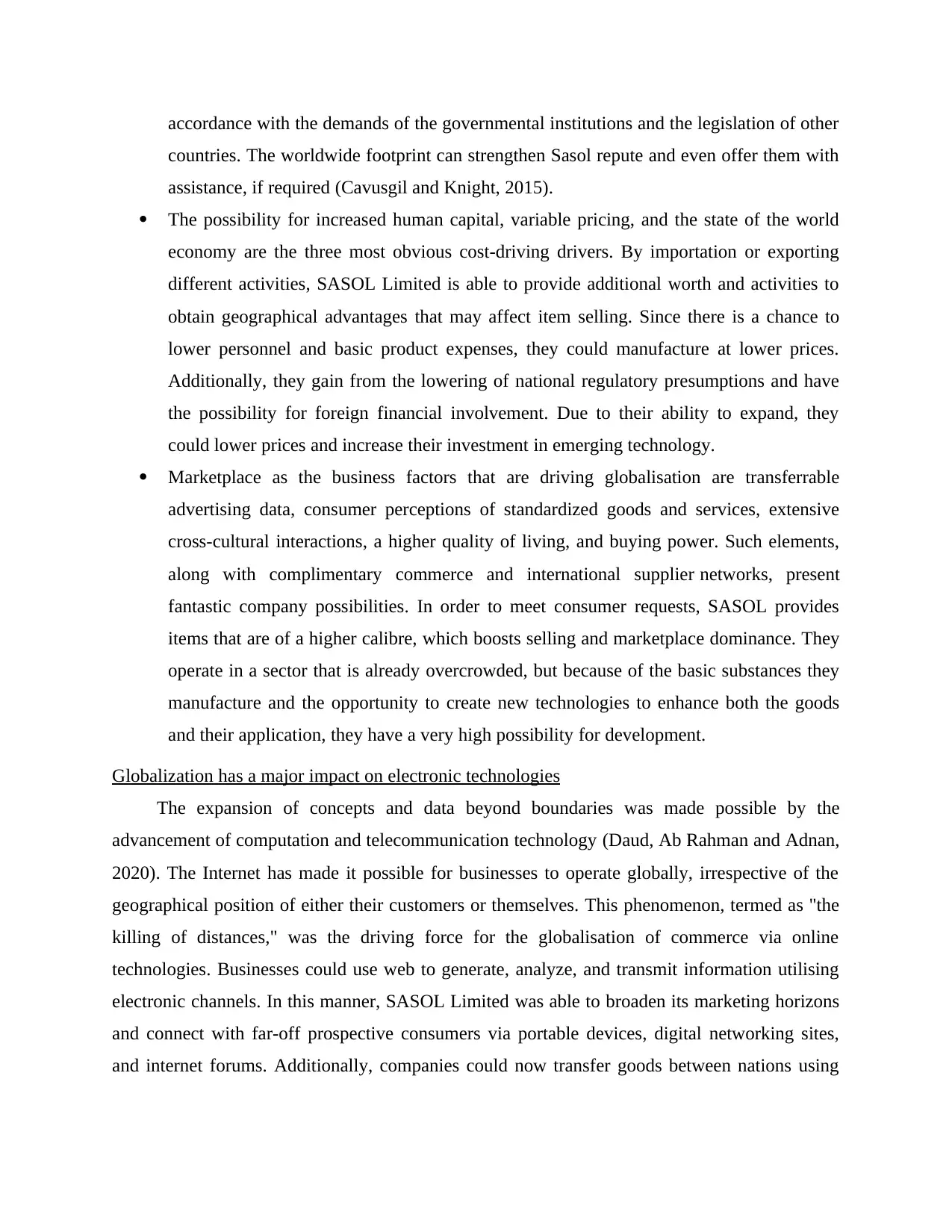
accordance with the demands of the governmental institutions and the legislation of other
countries. The worldwide footprint can strengthen Sasol repute and even offer them with
assistance, if required (Cavusgil and Knight, 2015).
The possibility for increased human capital, variable pricing, and the state of the world
economy are the three most obvious cost-driving drivers. By importation or exporting
different activities, SASOL Limited is able to provide additional worth and activities to
obtain geographical advantages that may affect item selling. Since there is a chance to
lower personnel and basic product expenses, they could manufacture at lower prices.
Additionally, they gain from the lowering of national regulatory presumptions and have
the possibility for foreign financial involvement. Due to their ability to expand, they
could lower prices and increase their investment in emerging technology.
Marketplace as the business factors that are driving globalisation are transferrable
advertising data, consumer perceptions of standardized goods and services, extensive
cross-cultural interactions, a higher quality of living, and buying power. Such elements,
along with complimentary commerce and international supplier networks, present
fantastic company possibilities. In order to meet consumer requests, SASOL provides
items that are of a higher calibre, which boosts selling and marketplace dominance. They
operate in a sector that is already overcrowded, but because of the basic substances they
manufacture and the opportunity to create new technologies to enhance both the goods
and their application, they have a very high possibility for development.
Globalization has a major impact on electronic technologies
The expansion of concepts and data beyond boundaries was made possible by the
advancement of computation and telecommunication technology (Daud, Ab Rahman and Adnan,
2020). The Internet has made it possible for businesses to operate globally, irrespective of the
geographical position of either their customers or themselves. This phenomenon, termed as "the
killing of distances," was the driving force for the globalisation of commerce via online
technologies. Businesses could use web to generate, analyze, and transmit information utilising
electronic channels. In this manner, SASOL Limited was able to broaden its marketing horizons
and connect with far-off prospective consumers via portable devices, digital networking sites,
and internet forums. Additionally, companies could now transfer goods between nations using
countries. The worldwide footprint can strengthen Sasol repute and even offer them with
assistance, if required (Cavusgil and Knight, 2015).
The possibility for increased human capital, variable pricing, and the state of the world
economy are the three most obvious cost-driving drivers. By importation or exporting
different activities, SASOL Limited is able to provide additional worth and activities to
obtain geographical advantages that may affect item selling. Since there is a chance to
lower personnel and basic product expenses, they could manufacture at lower prices.
Additionally, they gain from the lowering of national regulatory presumptions and have
the possibility for foreign financial involvement. Due to their ability to expand, they
could lower prices and increase their investment in emerging technology.
Marketplace as the business factors that are driving globalisation are transferrable
advertising data, consumer perceptions of standardized goods and services, extensive
cross-cultural interactions, a higher quality of living, and buying power. Such elements,
along with complimentary commerce and international supplier networks, present
fantastic company possibilities. In order to meet consumer requests, SASOL provides
items that are of a higher calibre, which boosts selling and marketplace dominance. They
operate in a sector that is already overcrowded, but because of the basic substances they
manufacture and the opportunity to create new technologies to enhance both the goods
and their application, they have a very high possibility for development.
Globalization has a major impact on electronic technologies
The expansion of concepts and data beyond boundaries was made possible by the
advancement of computation and telecommunication technology (Daud, Ab Rahman and Adnan,
2020). The Internet has made it possible for businesses to operate globally, irrespective of the
geographical position of either their customers or themselves. This phenomenon, termed as "the
killing of distances," was the driving force for the globalisation of commerce via online
technologies. Businesses could use web to generate, analyze, and transmit information utilising
electronic channels. In this manner, SASOL Limited was able to broaden its marketing horizons
and connect with far-off prospective consumers via portable devices, digital networking sites,
and internet forums. Additionally, companies could now transfer goods between nations using
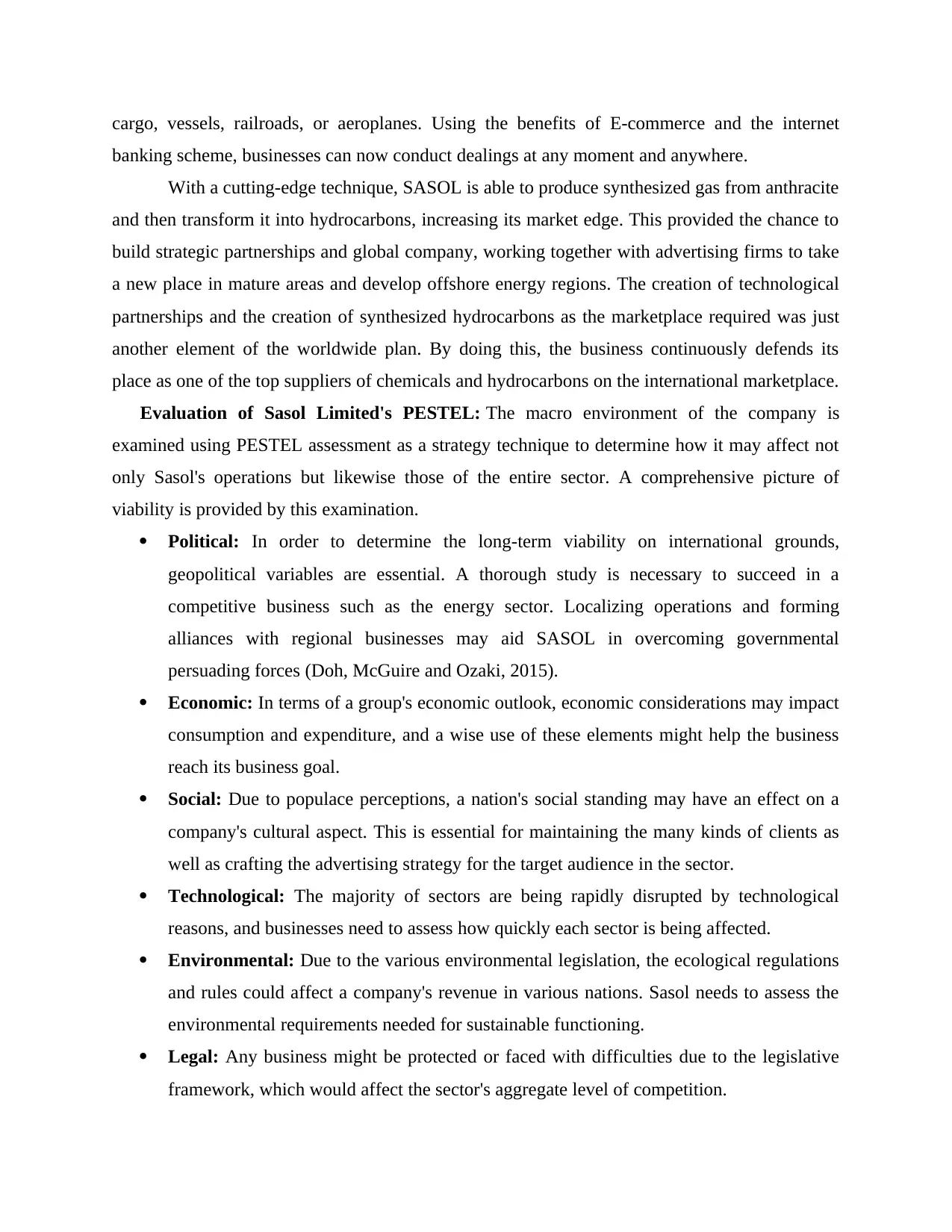
cargo, vessels, railroads, or aeroplanes. Using the benefits of E-commerce and the internet
banking scheme, businesses can now conduct dealings at any moment and anywhere.
With a cutting-edge technique, SASOL is able to produce synthesized gas from anthracite
and then transform it into hydrocarbons, increasing its market edge. This provided the chance to
build strategic partnerships and global company, working together with advertising firms to take
a new place in mature areas and develop offshore energy regions. The creation of technological
partnerships and the creation of synthesized hydrocarbons as the marketplace required was just
another element of the worldwide plan. By doing this, the business continuously defends its
place as one of the top suppliers of chemicals and hydrocarbons on the international marketplace.
Evaluation of Sasol Limited's PESTEL: The macro environment of the company is
examined using PESTEL assessment as a strategy technique to determine how it may affect not
only Sasol's operations but likewise those of the entire sector. A comprehensive picture of
viability is provided by this examination.
Political: In order to determine the long-term viability on international grounds,
geopolitical variables are essential. A thorough study is necessary to succeed in a
competitive business such as the energy sector. Localizing operations and forming
alliances with regional businesses may aid SASOL in overcoming governmental
persuading forces (Doh, McGuire and Ozaki, 2015).
Economic: In terms of a group's economic outlook, economic considerations may impact
consumption and expenditure, and a wise use of these elements might help the business
reach its business goal.
Social: Due to populace perceptions, a nation's social standing may have an effect on a
company's cultural aspect. This is essential for maintaining the many kinds of clients as
well as crafting the advertising strategy for the target audience in the sector.
Technological: The majority of sectors are being rapidly disrupted by technological
reasons, and businesses need to assess how quickly each sector is being affected.
Environmental: Due to the various environmental legislation, the ecological regulations
and rules could affect a company's revenue in various nations. Sasol needs to assess the
environmental requirements needed for sustainable functioning.
Legal: Any business might be protected or faced with difficulties due to the legislative
framework, which would affect the sector's aggregate level of competition.
banking scheme, businesses can now conduct dealings at any moment and anywhere.
With a cutting-edge technique, SASOL is able to produce synthesized gas from anthracite
and then transform it into hydrocarbons, increasing its market edge. This provided the chance to
build strategic partnerships and global company, working together with advertising firms to take
a new place in mature areas and develop offshore energy regions. The creation of technological
partnerships and the creation of synthesized hydrocarbons as the marketplace required was just
another element of the worldwide plan. By doing this, the business continuously defends its
place as one of the top suppliers of chemicals and hydrocarbons on the international marketplace.
Evaluation of Sasol Limited's PESTEL: The macro environment of the company is
examined using PESTEL assessment as a strategy technique to determine how it may affect not
only Sasol's operations but likewise those of the entire sector. A comprehensive picture of
viability is provided by this examination.
Political: In order to determine the long-term viability on international grounds,
geopolitical variables are essential. A thorough study is necessary to succeed in a
competitive business such as the energy sector. Localizing operations and forming
alliances with regional businesses may aid SASOL in overcoming governmental
persuading forces (Doh, McGuire and Ozaki, 2015).
Economic: In terms of a group's economic outlook, economic considerations may impact
consumption and expenditure, and a wise use of these elements might help the business
reach its business goal.
Social: Due to populace perceptions, a nation's social standing may have an effect on a
company's cultural aspect. This is essential for maintaining the many kinds of clients as
well as crafting the advertising strategy for the target audience in the sector.
Technological: The majority of sectors are being rapidly disrupted by technological
reasons, and businesses need to assess how quickly each sector is being affected.
Environmental: Due to the various environmental legislation, the ecological regulations
and rules could affect a company's revenue in various nations. Sasol needs to assess the
environmental requirements needed for sustainable functioning.
Legal: Any business might be protected or faced with difficulties due to the legislative
framework, which would affect the sector's aggregate level of competition.
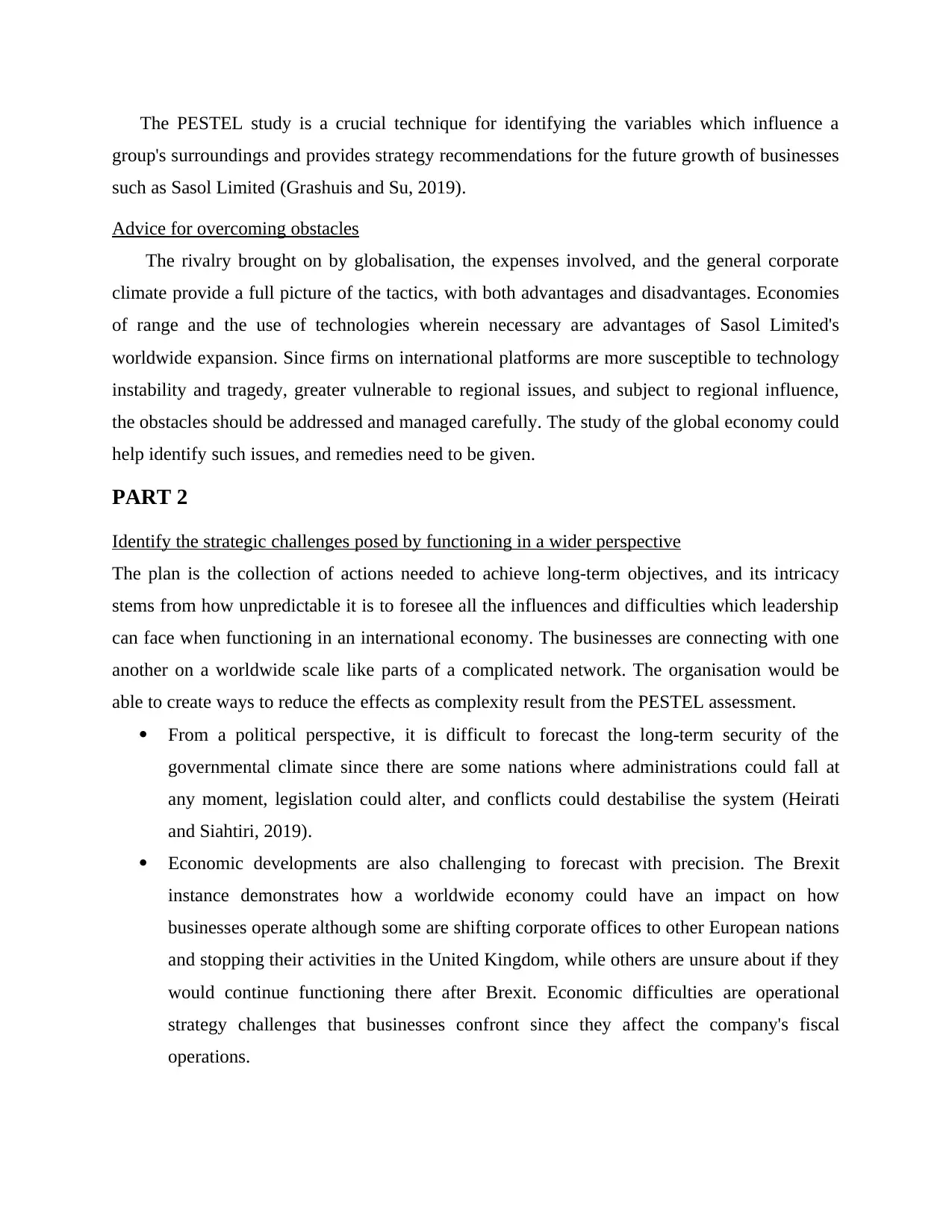
The PESTEL study is a crucial technique for identifying the variables which influence a
group's surroundings and provides strategy recommendations for the future growth of businesses
such as Sasol Limited (Grashuis and Su, 2019).
Advice for overcoming obstacles
The rivalry brought on by globalisation, the expenses involved, and the general corporate
climate provide a full picture of the tactics, with both advantages and disadvantages. Economies
of range and the use of technologies wherein necessary are advantages of Sasol Limited's
worldwide expansion. Since firms on international platforms are more susceptible to technology
instability and tragedy, greater vulnerable to regional issues, and subject to regional influence,
the obstacles should be addressed and managed carefully. The study of the global economy could
help identify such issues, and remedies need to be given.
PART 2
Identify the strategic challenges posed by functioning in a wider perspective
The plan is the collection of actions needed to achieve long-term objectives, and its intricacy
stems from how unpredictable it is to foresee all the influences and difficulties which leadership
can face when functioning in an international economy. The businesses are connecting with one
another on a worldwide scale like parts of a complicated network. The organisation would be
able to create ways to reduce the effects as complexity result from the PESTEL assessment.
From a political perspective, it is difficult to forecast the long-term security of the
governmental climate since there are some nations where administrations could fall at
any moment, legislation could alter, and conflicts could destabilise the system (Heirati
and Siahtiri, 2019).
Economic developments are also challenging to forecast with precision. The Brexit
instance demonstrates how a worldwide economy could have an impact on how
businesses operate although some are shifting corporate offices to other European nations
and stopping their activities in the United Kingdom, while others are unsure about if they
would continue functioning there after Brexit. Economic difficulties are operational
strategy challenges that businesses confront since they affect the company's fiscal
operations.
group's surroundings and provides strategy recommendations for the future growth of businesses
such as Sasol Limited (Grashuis and Su, 2019).
Advice for overcoming obstacles
The rivalry brought on by globalisation, the expenses involved, and the general corporate
climate provide a full picture of the tactics, with both advantages and disadvantages. Economies
of range and the use of technologies wherein necessary are advantages of Sasol Limited's
worldwide expansion. Since firms on international platforms are more susceptible to technology
instability and tragedy, greater vulnerable to regional issues, and subject to regional influence,
the obstacles should be addressed and managed carefully. The study of the global economy could
help identify such issues, and remedies need to be given.
PART 2
Identify the strategic challenges posed by functioning in a wider perspective
The plan is the collection of actions needed to achieve long-term objectives, and its intricacy
stems from how unpredictable it is to foresee all the influences and difficulties which leadership
can face when functioning in an international economy. The businesses are connecting with one
another on a worldwide scale like parts of a complicated network. The organisation would be
able to create ways to reduce the effects as complexity result from the PESTEL assessment.
From a political perspective, it is difficult to forecast the long-term security of the
governmental climate since there are some nations where administrations could fall at
any moment, legislation could alter, and conflicts could destabilise the system (Heirati
and Siahtiri, 2019).
Economic developments are also challenging to forecast with precision. The Brexit
instance demonstrates how a worldwide economy could have an impact on how
businesses operate although some are shifting corporate offices to other European nations
and stopping their activities in the United Kingdom, while others are unsure about if they
would continue functioning there after Brexit. Economic difficulties are operational
strategy challenges that businesses confront since they affect the company's fiscal
operations.
Paraphrase This Document
Need a fresh take? Get an instant paraphrase of this document with our AI Paraphraser
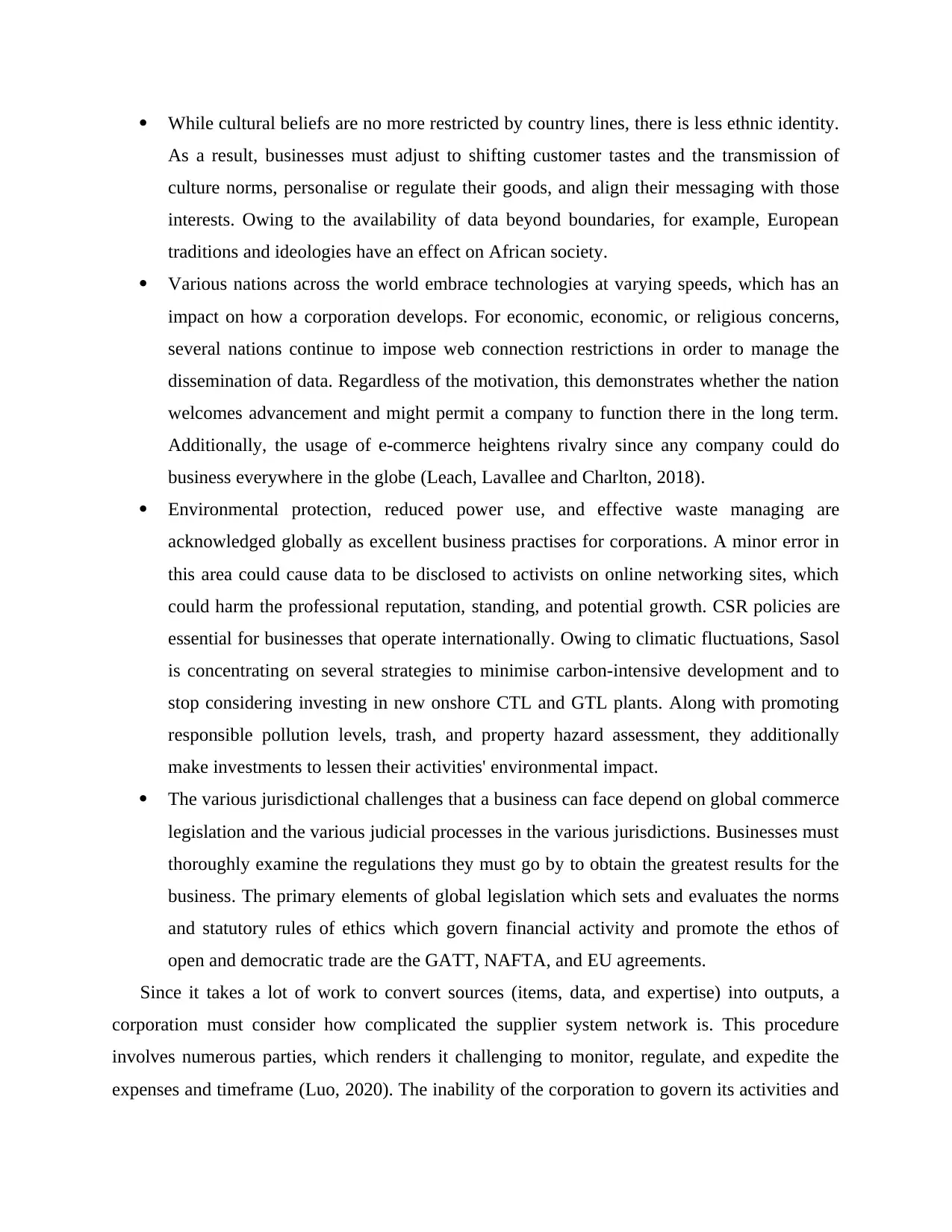
While cultural beliefs are no more restricted by country lines, there is less ethnic identity.
As a result, businesses must adjust to shifting customer tastes and the transmission of
culture norms, personalise or regulate their goods, and align their messaging with those
interests. Owing to the availability of data beyond boundaries, for example, European
traditions and ideologies have an effect on African society.
Various nations across the world embrace technologies at varying speeds, which has an
impact on how a corporation develops. For economic, economic, or religious concerns,
several nations continue to impose web connection restrictions in order to manage the
dissemination of data. Regardless of the motivation, this demonstrates whether the nation
welcomes advancement and might permit a company to function there in the long term.
Additionally, the usage of e-commerce heightens rivalry since any company could do
business everywhere in the globe (Leach, Lavallee and Charlton, 2018).
Environmental protection, reduced power use, and effective waste managing are
acknowledged globally as excellent business practises for corporations. A minor error in
this area could cause data to be disclosed to activists on online networking sites, which
could harm the professional reputation, standing, and potential growth. CSR policies are
essential for businesses that operate internationally. Owing to climatic fluctuations, Sasol
is concentrating on several strategies to minimise carbon-intensive development and to
stop considering investing in new onshore CTL and GTL plants. Along with promoting
responsible pollution levels, trash, and property hazard assessment, they additionally
make investments to lessen their activities' environmental impact.
The various jurisdictional challenges that a business can face depend on global commerce
legislation and the various judicial processes in the various jurisdictions. Businesses must
thoroughly examine the regulations they must go by to obtain the greatest results for the
business. The primary elements of global legislation which sets and evaluates the norms
and statutory rules of ethics which govern financial activity and promote the ethos of
open and democratic trade are the GATT, NAFTA, and EU agreements.
Since it takes a lot of work to convert sources (items, data, and expertise) into outputs, a
corporation must consider how complicated the supplier system network is. This procedure
involves numerous parties, which renders it challenging to monitor, regulate, and expedite the
expenses and timeframe (Luo, 2020). The inability of the corporation to govern its activities and
As a result, businesses must adjust to shifting customer tastes and the transmission of
culture norms, personalise or regulate their goods, and align their messaging with those
interests. Owing to the availability of data beyond boundaries, for example, European
traditions and ideologies have an effect on African society.
Various nations across the world embrace technologies at varying speeds, which has an
impact on how a corporation develops. For economic, economic, or religious concerns,
several nations continue to impose web connection restrictions in order to manage the
dissemination of data. Regardless of the motivation, this demonstrates whether the nation
welcomes advancement and might permit a company to function there in the long term.
Additionally, the usage of e-commerce heightens rivalry since any company could do
business everywhere in the globe (Leach, Lavallee and Charlton, 2018).
Environmental protection, reduced power use, and effective waste managing are
acknowledged globally as excellent business practises for corporations. A minor error in
this area could cause data to be disclosed to activists on online networking sites, which
could harm the professional reputation, standing, and potential growth. CSR policies are
essential for businesses that operate internationally. Owing to climatic fluctuations, Sasol
is concentrating on several strategies to minimise carbon-intensive development and to
stop considering investing in new onshore CTL and GTL plants. Along with promoting
responsible pollution levels, trash, and property hazard assessment, they additionally
make investments to lessen their activities' environmental impact.
The various jurisdictional challenges that a business can face depend on global commerce
legislation and the various judicial processes in the various jurisdictions. Businesses must
thoroughly examine the regulations they must go by to obtain the greatest results for the
business. The primary elements of global legislation which sets and evaluates the norms
and statutory rules of ethics which govern financial activity and promote the ethos of
open and democratic trade are the GATT, NAFTA, and EU agreements.
Since it takes a lot of work to convert sources (items, data, and expertise) into outputs, a
corporation must consider how complicated the supplier system network is. This procedure
involves numerous parties, which renders it challenging to monitor, regulate, and expedite the
expenses and timeframe (Luo, 2020). The inability of the corporation to govern its activities and
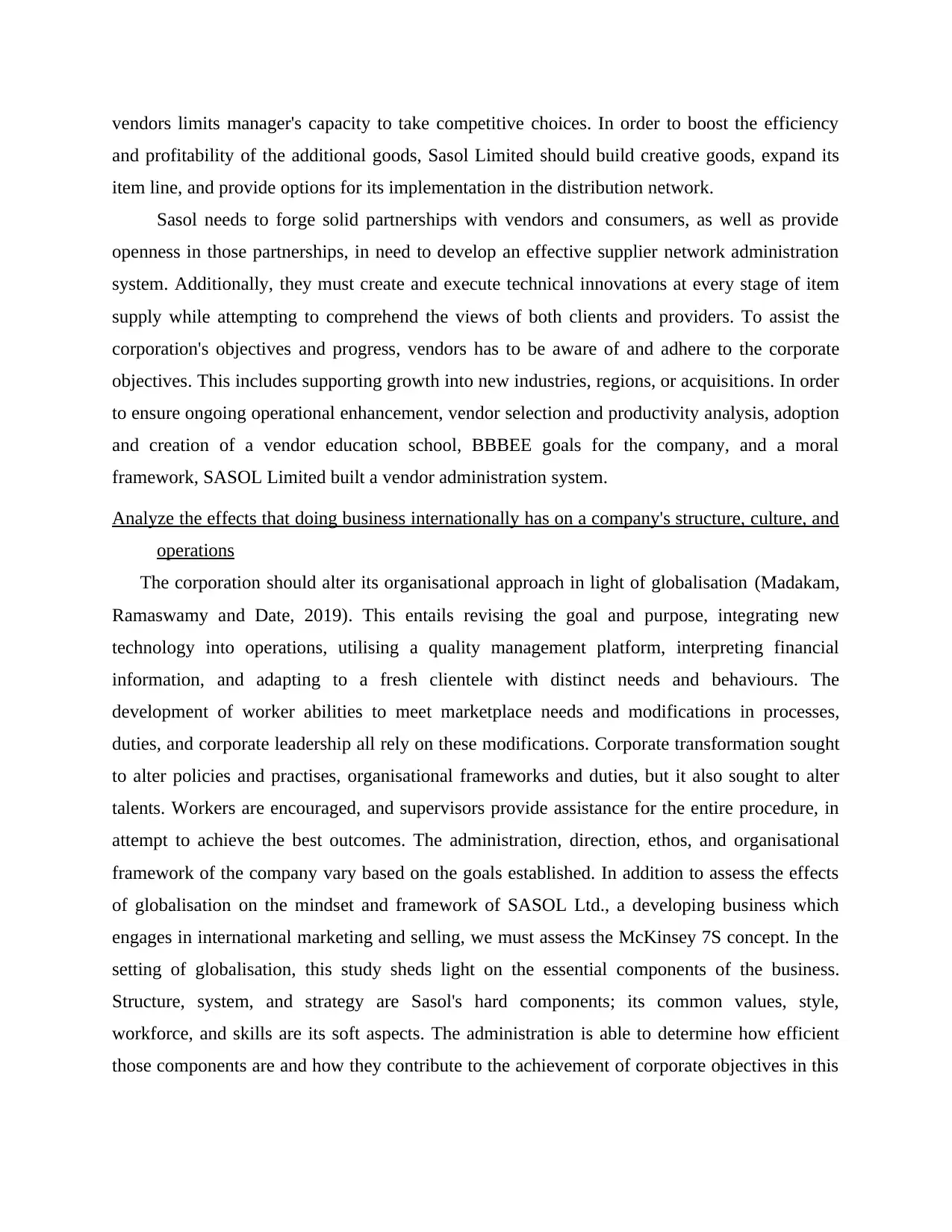
vendors limits manager's capacity to take competitive choices. In order to boost the efficiency
and profitability of the additional goods, Sasol Limited should build creative goods, expand its
item line, and provide options for its implementation in the distribution network.
Sasol needs to forge solid partnerships with vendors and consumers, as well as provide
openness in those partnerships, in need to develop an effective supplier network administration
system. Additionally, they must create and execute technical innovations at every stage of item
supply while attempting to comprehend the views of both clients and providers. To assist the
corporation's objectives and progress, vendors has to be aware of and adhere to the corporate
objectives. This includes supporting growth into new industries, regions, or acquisitions. In order
to ensure ongoing operational enhancement, vendor selection and productivity analysis, adoption
and creation of a vendor education school, BBBEE goals for the company, and a moral
framework, SASOL Limited built a vendor administration system.
Analyze the effects that doing business internationally has on a company's structure, culture, and
operations
The corporation should alter its organisational approach in light of globalisation (Madakam,
Ramaswamy and Date, 2019). This entails revising the goal and purpose, integrating new
technology into operations, utilising a quality management platform, interpreting financial
information, and adapting to a fresh clientele with distinct needs and behaviours. The
development of worker abilities to meet marketplace needs and modifications in processes,
duties, and corporate leadership all rely on these modifications. Corporate transformation sought
to alter policies and practises, organisational frameworks and duties, but it also sought to alter
talents. Workers are encouraged, and supervisors provide assistance for the entire procedure, in
attempt to achieve the best outcomes. The administration, direction, ethos, and organisational
framework of the company vary based on the goals established. In addition to assess the effects
of globalisation on the mindset and framework of SASOL Ltd., a developing business which
engages in international marketing and selling, we must assess the McKinsey 7S concept. In the
setting of globalisation, this study sheds light on the essential components of the business.
Structure, system, and strategy are Sasol's hard components; its common values, style,
workforce, and skills are its soft aspects. The administration is able to determine how efficient
those components are and how they contribute to the achievement of corporate objectives in this
and profitability of the additional goods, Sasol Limited should build creative goods, expand its
item line, and provide options for its implementation in the distribution network.
Sasol needs to forge solid partnerships with vendors and consumers, as well as provide
openness in those partnerships, in need to develop an effective supplier network administration
system. Additionally, they must create and execute technical innovations at every stage of item
supply while attempting to comprehend the views of both clients and providers. To assist the
corporation's objectives and progress, vendors has to be aware of and adhere to the corporate
objectives. This includes supporting growth into new industries, regions, or acquisitions. In order
to ensure ongoing operational enhancement, vendor selection and productivity analysis, adoption
and creation of a vendor education school, BBBEE goals for the company, and a moral
framework, SASOL Limited built a vendor administration system.
Analyze the effects that doing business internationally has on a company's structure, culture, and
operations
The corporation should alter its organisational approach in light of globalisation (Madakam,
Ramaswamy and Date, 2019). This entails revising the goal and purpose, integrating new
technology into operations, utilising a quality management platform, interpreting financial
information, and adapting to a fresh clientele with distinct needs and behaviours. The
development of worker abilities to meet marketplace needs and modifications in processes,
duties, and corporate leadership all rely on these modifications. Corporate transformation sought
to alter policies and practises, organisational frameworks and duties, but it also sought to alter
talents. Workers are encouraged, and supervisors provide assistance for the entire procedure, in
attempt to achieve the best outcomes. The administration, direction, ethos, and organisational
framework of the company vary based on the goals established. In addition to assess the effects
of globalisation on the mindset and framework of SASOL Ltd., a developing business which
engages in international marketing and selling, we must assess the McKinsey 7S concept. In the
setting of globalisation, this study sheds light on the essential components of the business.
Structure, system, and strategy are Sasol's hard components; its common values, style,
workforce, and skills are its soft aspects. The administration is able to determine how efficient
those components are and how they contribute to the achievement of corporate objectives in this
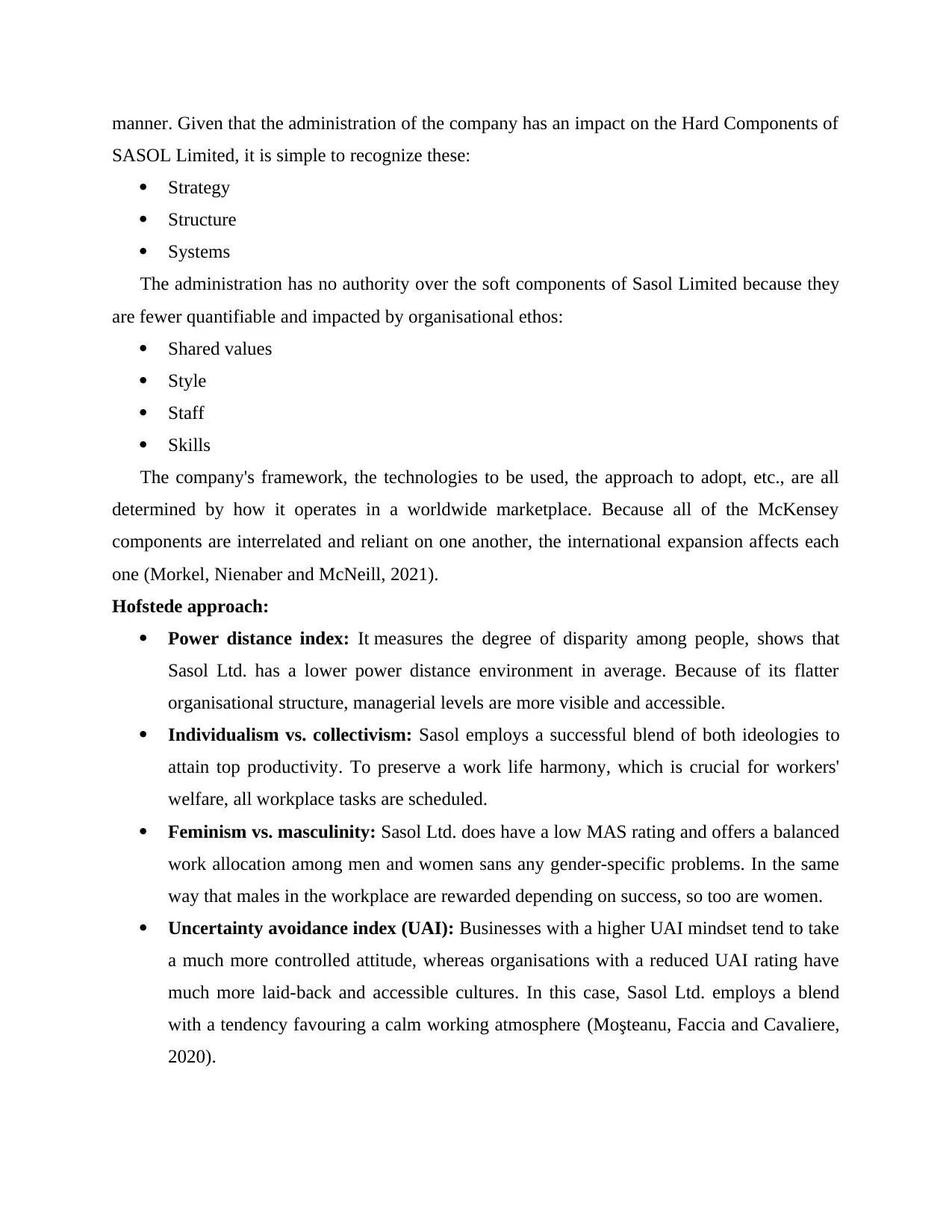
manner. Given that the administration of the company has an impact on the Hard Components of
SASOL Limited, it is simple to recognize these:
Strategy
Structure
Systems
The administration has no authority over the soft components of Sasol Limited because they
are fewer quantifiable and impacted by organisational ethos:
Shared values
Style
Staff
Skills
The company's framework, the technologies to be used, the approach to adopt, etc., are all
determined by how it operates in a worldwide marketplace. Because all of the McKensey
components are interrelated and reliant on one another, the international expansion affects each
one (Morkel, Nienaber and McNeill, 2021).
Hofstede approach:
Power distance index: It measures the degree of disparity among people, shows that
Sasol Ltd. has a lower power distance environment in average. Because of its flatter
organisational structure, managerial levels are more visible and accessible.
Individualism vs. collectivism: Sasol employs a successful blend of both ideologies to
attain top productivity. To preserve a work life harmony, which is crucial for workers'
welfare, all workplace tasks are scheduled.
Feminism vs. masculinity: Sasol Ltd. does have a low MAS rating and offers a balanced
work allocation among men and women sans any gender-specific problems. In the same
way that males in the workplace are rewarded depending on success, so too are women.
Uncertainty avoidance index (UAI): Businesses with a higher UAI mindset tend to take
a much more controlled attitude, whereas organisations with a reduced UAI rating have
much more laid-back and accessible cultures. In this case, Sasol Ltd. employs a blend
with a tendency favouring a calm working atmosphere (Moşteanu, Faccia and Cavaliere,
2020).
SASOL Limited, it is simple to recognize these:
Strategy
Structure
Systems
The administration has no authority over the soft components of Sasol Limited because they
are fewer quantifiable and impacted by organisational ethos:
Shared values
Style
Staff
Skills
The company's framework, the technologies to be used, the approach to adopt, etc., are all
determined by how it operates in a worldwide marketplace. Because all of the McKensey
components are interrelated and reliant on one another, the international expansion affects each
one (Morkel, Nienaber and McNeill, 2021).
Hofstede approach:
Power distance index: It measures the degree of disparity among people, shows that
Sasol Ltd. has a lower power distance environment in average. Because of its flatter
organisational structure, managerial levels are more visible and accessible.
Individualism vs. collectivism: Sasol employs a successful blend of both ideologies to
attain top productivity. To preserve a work life harmony, which is crucial for workers'
welfare, all workplace tasks are scheduled.
Feminism vs. masculinity: Sasol Ltd. does have a low MAS rating and offers a balanced
work allocation among men and women sans any gender-specific problems. In the same
way that males in the workplace are rewarded depending on success, so too are women.
Uncertainty avoidance index (UAI): Businesses with a higher UAI mindset tend to take
a much more controlled attitude, whereas organisations with a reduced UAI rating have
much more laid-back and accessible cultures. In this case, Sasol Ltd. employs a blend
with a tendency favouring a calm working atmosphere (Moşteanu, Faccia and Cavaliere,
2020).
Secure Best Marks with AI Grader
Need help grading? Try our AI Grader for instant feedback on your assignments.
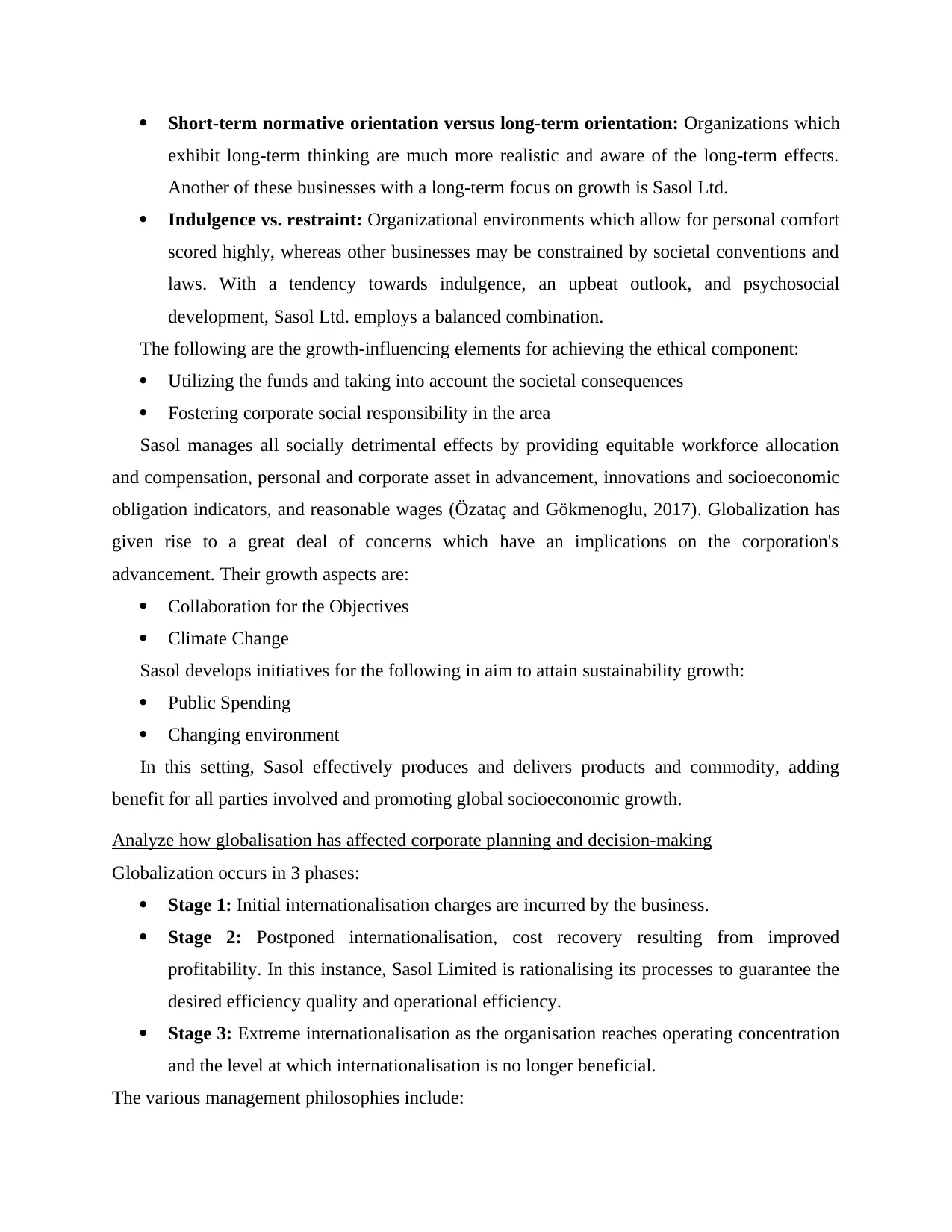
Short-term normative orientation versus long-term orientation: Organizations which
exhibit long-term thinking are much more realistic and aware of the long-term effects.
Another of these businesses with a long-term focus on growth is Sasol Ltd.
Indulgence vs. restraint: Organizational environments which allow for personal comfort
scored highly, whereas other businesses may be constrained by societal conventions and
laws. With a tendency towards indulgence, an upbeat outlook, and psychosocial
development, Sasol Ltd. employs a balanced combination.
The following are the growth-influencing elements for achieving the ethical component:
Utilizing the funds and taking into account the societal consequences
Fostering corporate social responsibility in the area
Sasol manages all socially detrimental effects by providing equitable workforce allocation
and compensation, personal and corporate asset in advancement, innovations and socioeconomic
obligation indicators, and reasonable wages (Özataç and Gökmenoglu, 2017). Globalization has
given rise to a great deal of concerns which have an implications on the corporation's
advancement. Their growth aspects are:
Collaboration for the Objectives
Climate Change
Sasol develops initiatives for the following in aim to attain sustainability growth:
Public Spending
Changing environment
In this setting, Sasol effectively produces and delivers products and commodity, adding
benefit for all parties involved and promoting global socioeconomic growth.
Analyze how globalisation has affected corporate planning and decision-making
Globalization occurs in 3 phases:
Stage 1: Initial internationalisation charges are incurred by the business.
Stage 2: Postponed internationalisation, cost recovery resulting from improved
profitability. In this instance, Sasol Limited is rationalising its processes to guarantee the
desired efficiency quality and operational efficiency.
Stage 3: Extreme internationalisation as the organisation reaches operating concentration
and the level at which internationalisation is no longer beneficial.
The various management philosophies include:
exhibit long-term thinking are much more realistic and aware of the long-term effects.
Another of these businesses with a long-term focus on growth is Sasol Ltd.
Indulgence vs. restraint: Organizational environments which allow for personal comfort
scored highly, whereas other businesses may be constrained by societal conventions and
laws. With a tendency towards indulgence, an upbeat outlook, and psychosocial
development, Sasol Ltd. employs a balanced combination.
The following are the growth-influencing elements for achieving the ethical component:
Utilizing the funds and taking into account the societal consequences
Fostering corporate social responsibility in the area
Sasol manages all socially detrimental effects by providing equitable workforce allocation
and compensation, personal and corporate asset in advancement, innovations and socioeconomic
obligation indicators, and reasonable wages (Özataç and Gökmenoglu, 2017). Globalization has
given rise to a great deal of concerns which have an implications on the corporation's
advancement. Their growth aspects are:
Collaboration for the Objectives
Climate Change
Sasol develops initiatives for the following in aim to attain sustainability growth:
Public Spending
Changing environment
In this setting, Sasol effectively produces and delivers products and commodity, adding
benefit for all parties involved and promoting global socioeconomic growth.
Analyze how globalisation has affected corporate planning and decision-making
Globalization occurs in 3 phases:
Stage 1: Initial internationalisation charges are incurred by the business.
Stage 2: Postponed internationalisation, cost recovery resulting from improved
profitability. In this instance, Sasol Limited is rationalising its processes to guarantee the
desired efficiency quality and operational efficiency.
Stage 3: Extreme internationalisation as the organisation reaches operating concentration
and the level at which internationalisation is no longer beneficial.
The various management philosophies include:
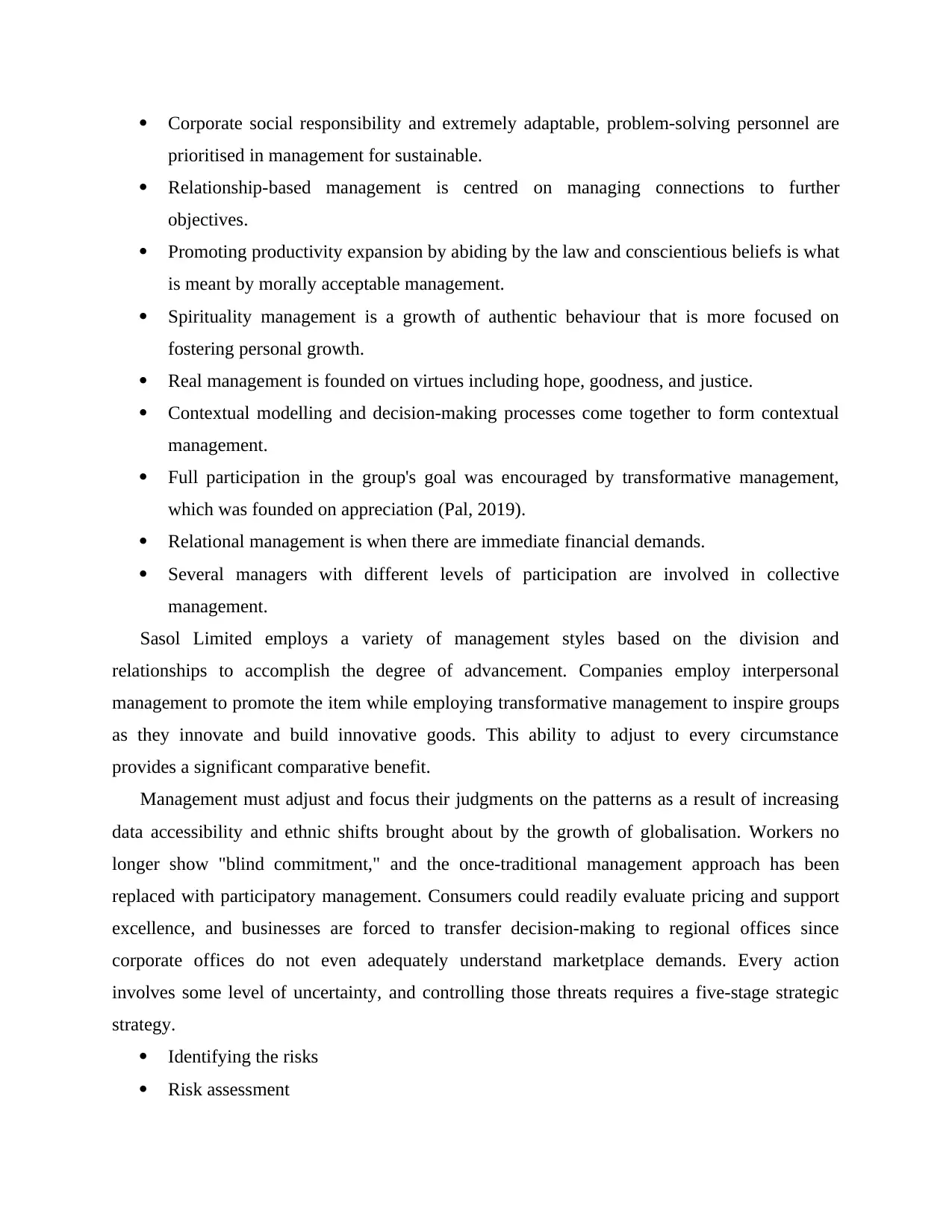
Corporate social responsibility and extremely adaptable, problem-solving personnel are
prioritised in management for sustainable.
Relationship-based management is centred on managing connections to further
objectives.
Promoting productivity expansion by abiding by the law and conscientious beliefs is what
is meant by morally acceptable management.
Spirituality management is a growth of authentic behaviour that is more focused on
fostering personal growth.
Real management is founded on virtues including hope, goodness, and justice.
Contextual modelling and decision-making processes come together to form contextual
management.
Full participation in the group's goal was encouraged by transformative management,
which was founded on appreciation (Pal, 2019).
Relational management is when there are immediate financial demands.
Several managers with different levels of participation are involved in collective
management.
Sasol Limited employs a variety of management styles based on the division and
relationships to accomplish the degree of advancement. Companies employ interpersonal
management to promote the item while employing transformative management to inspire groups
as they innovate and build innovative goods. This ability to adjust to every circumstance
provides a significant comparative benefit.
Management must adjust and focus their judgments on the patterns as a result of increasing
data accessibility and ethnic shifts brought about by the growth of globalisation. Workers no
longer show "blind commitment," and the once-traditional management approach has been
replaced with participatory management. Consumers could readily evaluate pricing and support
excellence, and businesses are forced to transfer decision-making to regional offices since
corporate offices do not even adequately understand marketplace demands. Every action
involves some level of uncertainty, and controlling those threats requires a five-stage strategic
strategy.
Identifying the risks
Risk assessment
prioritised in management for sustainable.
Relationship-based management is centred on managing connections to further
objectives.
Promoting productivity expansion by abiding by the law and conscientious beliefs is what
is meant by morally acceptable management.
Spirituality management is a growth of authentic behaviour that is more focused on
fostering personal growth.
Real management is founded on virtues including hope, goodness, and justice.
Contextual modelling and decision-making processes come together to form contextual
management.
Full participation in the group's goal was encouraged by transformative management,
which was founded on appreciation (Pal, 2019).
Relational management is when there are immediate financial demands.
Several managers with different levels of participation are involved in collective
management.
Sasol Limited employs a variety of management styles based on the division and
relationships to accomplish the degree of advancement. Companies employ interpersonal
management to promote the item while employing transformative management to inspire groups
as they innovate and build innovative goods. This ability to adjust to every circumstance
provides a significant comparative benefit.
Management must adjust and focus their judgments on the patterns as a result of increasing
data accessibility and ethnic shifts brought about by the growth of globalisation. Workers no
longer show "blind commitment," and the once-traditional management approach has been
replaced with participatory management. Consumers could readily evaluate pricing and support
excellence, and businesses are forced to transfer decision-making to regional offices since
corporate offices do not even adequately understand marketplace demands. Every action
involves some level of uncertainty, and controlling those threats requires a five-stage strategic
strategy.
Identifying the risks
Risk assessment
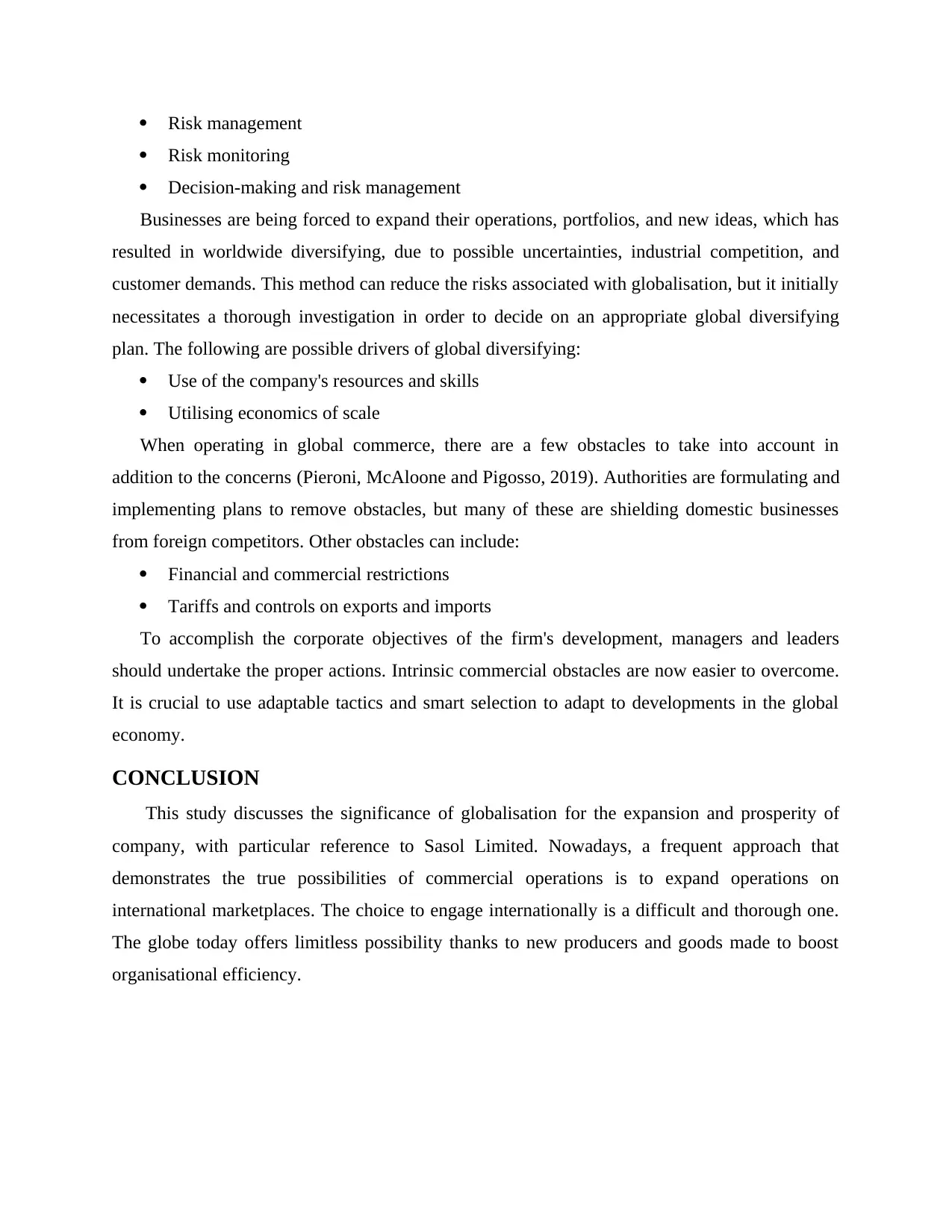
Risk management
Risk monitoring
Decision-making and risk management
Businesses are being forced to expand their operations, portfolios, and new ideas, which has
resulted in worldwide diversifying, due to possible uncertainties, industrial competition, and
customer demands. This method can reduce the risks associated with globalisation, but it initially
necessitates a thorough investigation in order to decide on an appropriate global diversifying
plan. The following are possible drivers of global diversifying:
Use of the company's resources and skills
Utilising economics of scale
When operating in global commerce, there are a few obstacles to take into account in
addition to the concerns (Pieroni, McAloone and Pigosso, 2019). Authorities are formulating and
implementing plans to remove obstacles, but many of these are shielding domestic businesses
from foreign competitors. Other obstacles can include:
Financial and commercial restrictions
Tariffs and controls on exports and imports
To accomplish the corporate objectives of the firm's development, managers and leaders
should undertake the proper actions. Intrinsic commercial obstacles are now easier to overcome.
It is crucial to use adaptable tactics and smart selection to adapt to developments in the global
economy.
CONCLUSION
This study discusses the significance of globalisation for the expansion and prosperity of
company, with particular reference to Sasol Limited. Nowadays, a frequent approach that
demonstrates the true possibilities of commercial operations is to expand operations on
international marketplaces. The choice to engage internationally is a difficult and thorough one.
The globe today offers limitless possibility thanks to new producers and goods made to boost
organisational efficiency.
Risk monitoring
Decision-making and risk management
Businesses are being forced to expand their operations, portfolios, and new ideas, which has
resulted in worldwide diversifying, due to possible uncertainties, industrial competition, and
customer demands. This method can reduce the risks associated with globalisation, but it initially
necessitates a thorough investigation in order to decide on an appropriate global diversifying
plan. The following are possible drivers of global diversifying:
Use of the company's resources and skills
Utilising economics of scale
When operating in global commerce, there are a few obstacles to take into account in
addition to the concerns (Pieroni, McAloone and Pigosso, 2019). Authorities are formulating and
implementing plans to remove obstacles, but many of these are shielding domestic businesses
from foreign competitors. Other obstacles can include:
Financial and commercial restrictions
Tariffs and controls on exports and imports
To accomplish the corporate objectives of the firm's development, managers and leaders
should undertake the proper actions. Intrinsic commercial obstacles are now easier to overcome.
It is crucial to use adaptable tactics and smart selection to adapt to developments in the global
economy.
CONCLUSION
This study discusses the significance of globalisation for the expansion and prosperity of
company, with particular reference to Sasol Limited. Nowadays, a frequent approach that
demonstrates the true possibilities of commercial operations is to expand operations on
international marketplaces. The choice to engage internationally is a difficult and thorough one.
The globe today offers limitless possibility thanks to new producers and goods made to boost
organisational efficiency.
Paraphrase This Document
Need a fresh take? Get an instant paraphrase of this document with our AI Paraphraser
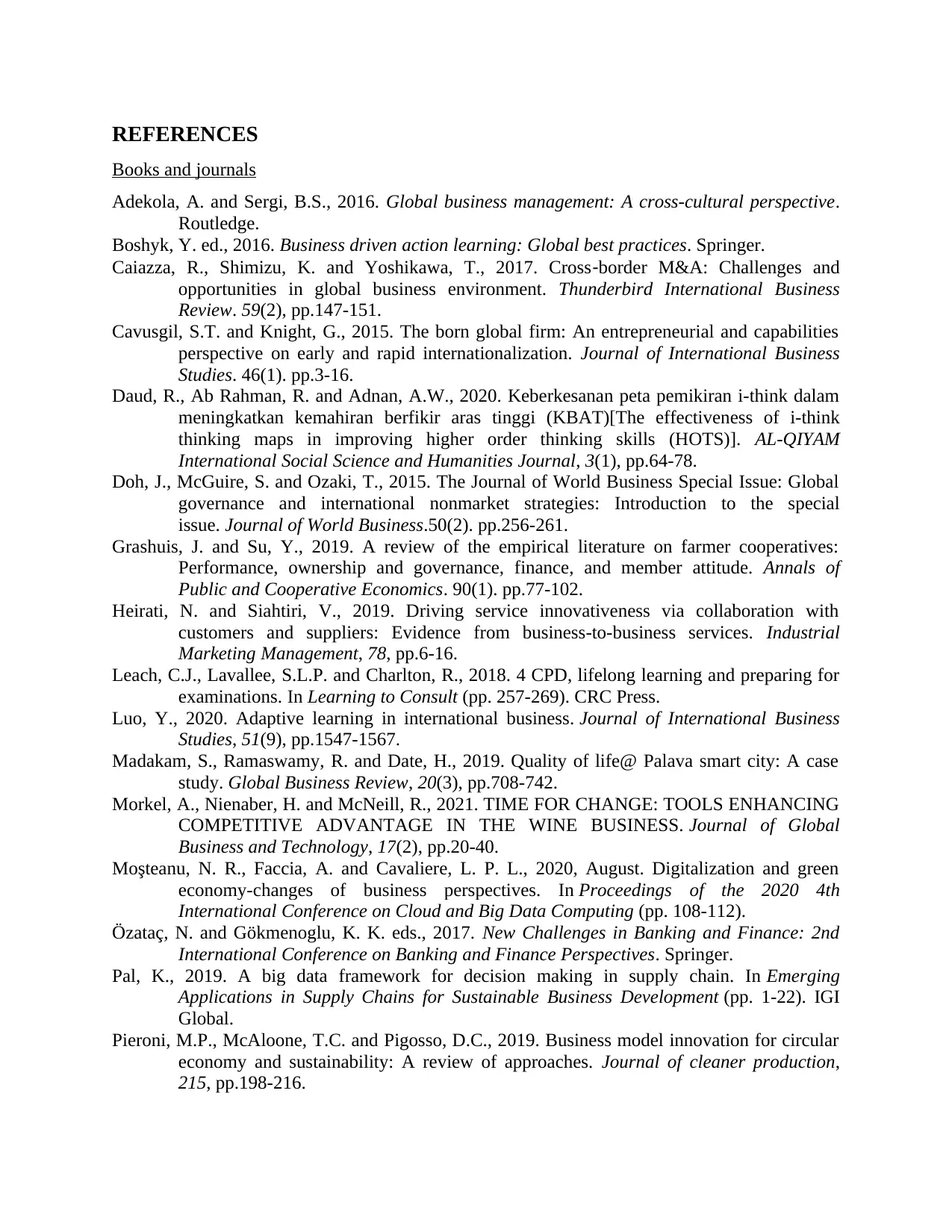
REFERENCES
Books and journals
Adekola, A. and Sergi, B.S., 2016. Global business management: A cross-cultural perspective.
Routledge.
Boshyk, Y. ed., 2016. Business driven action learning: Global best practices. Springer.
Caiazza, R., Shimizu, K. and Yoshikawa, T., 2017. Cross‐border M&A: Challenges and
opportunities in global business environment. Thunderbird International Business
Review. 59(2), pp.147-151.
Cavusgil, S.T. and Knight, G., 2015. The born global firm: An entrepreneurial and capabilities
perspective on early and rapid internationalization. Journal of International Business
Studies. 46(1). pp.3-16.
Daud, R., Ab Rahman, R. and Adnan, A.W., 2020. Keberkesanan peta pemikiran i-think dalam
meningkatkan kemahiran berfikir aras tinggi (KBAT)[The effectiveness of i-think
thinking maps in improving higher order thinking skills (HOTS)]. AL-QIYAM
International Social Science and Humanities Journal, 3(1), pp.64-78.
Doh, J., McGuire, S. and Ozaki, T., 2015. The Journal of World Business Special Issue: Global
governance and international nonmarket strategies: Introduction to the special
issue. Journal of World Business.50(2). pp.256-261.
Grashuis, J. and Su, Y., 2019. A review of the empirical literature on farmer cooperatives:
Performance, ownership and governance, finance, and member attitude. Annals of
Public and Cooperative Economics. 90(1). pp.77-102.
Heirati, N. and Siahtiri, V., 2019. Driving service innovativeness via collaboration with
customers and suppliers: Evidence from business-to-business services. Industrial
Marketing Management, 78, pp.6-16.
Leach, C.J., Lavallee, S.L.P. and Charlton, R., 2018. 4 CPD, lifelong learning and preparing for
examinations. In Learning to Consult (pp. 257-269). CRC Press.
Luo, Y., 2020. Adaptive learning in international business. Journal of International Business
Studies, 51(9), pp.1547-1567.
Madakam, S., Ramaswamy, R. and Date, H., 2019. Quality of life@ Palava smart city: A case
study. Global Business Review, 20(3), pp.708-742.
Morkel, A., Nienaber, H. and McNeill, R., 2021. TIME FOR CHANGE: TOOLS ENHANCING
COMPETITIVE ADVANTAGE IN THE WINE BUSINESS. Journal of Global
Business and Technology, 17(2), pp.20-40.
Moşteanu, N. R., Faccia, A. and Cavaliere, L. P. L., 2020, August. Digitalization and green
economy-changes of business perspectives. In Proceedings of the 2020 4th
International Conference on Cloud and Big Data Computing (pp. 108-112).
Özataç, N. and Gökmenoglu, K. K. eds., 2017. New Challenges in Banking and Finance: 2nd
International Conference on Banking and Finance Perspectives. Springer.
Pal, K., 2019. A big data framework for decision making in supply chain. In Emerging
Applications in Supply Chains for Sustainable Business Development (pp. 1-22). IGI
Global.
Pieroni, M.P., McAloone, T.C. and Pigosso, D.C., 2019. Business model innovation for circular
economy and sustainability: A review of approaches. Journal of cleaner production,
215, pp.198-216.
Books and journals
Adekola, A. and Sergi, B.S., 2016. Global business management: A cross-cultural perspective.
Routledge.
Boshyk, Y. ed., 2016. Business driven action learning: Global best practices. Springer.
Caiazza, R., Shimizu, K. and Yoshikawa, T., 2017. Cross‐border M&A: Challenges and
opportunities in global business environment. Thunderbird International Business
Review. 59(2), pp.147-151.
Cavusgil, S.T. and Knight, G., 2015. The born global firm: An entrepreneurial and capabilities
perspective on early and rapid internationalization. Journal of International Business
Studies. 46(1). pp.3-16.
Daud, R., Ab Rahman, R. and Adnan, A.W., 2020. Keberkesanan peta pemikiran i-think dalam
meningkatkan kemahiran berfikir aras tinggi (KBAT)[The effectiveness of i-think
thinking maps in improving higher order thinking skills (HOTS)]. AL-QIYAM
International Social Science and Humanities Journal, 3(1), pp.64-78.
Doh, J., McGuire, S. and Ozaki, T., 2015. The Journal of World Business Special Issue: Global
governance and international nonmarket strategies: Introduction to the special
issue. Journal of World Business.50(2). pp.256-261.
Grashuis, J. and Su, Y., 2019. A review of the empirical literature on farmer cooperatives:
Performance, ownership and governance, finance, and member attitude. Annals of
Public and Cooperative Economics. 90(1). pp.77-102.
Heirati, N. and Siahtiri, V., 2019. Driving service innovativeness via collaboration with
customers and suppliers: Evidence from business-to-business services. Industrial
Marketing Management, 78, pp.6-16.
Leach, C.J., Lavallee, S.L.P. and Charlton, R., 2018. 4 CPD, lifelong learning and preparing for
examinations. In Learning to Consult (pp. 257-269). CRC Press.
Luo, Y., 2020. Adaptive learning in international business. Journal of International Business
Studies, 51(9), pp.1547-1567.
Madakam, S., Ramaswamy, R. and Date, H., 2019. Quality of life@ Palava smart city: A case
study. Global Business Review, 20(3), pp.708-742.
Morkel, A., Nienaber, H. and McNeill, R., 2021. TIME FOR CHANGE: TOOLS ENHANCING
COMPETITIVE ADVANTAGE IN THE WINE BUSINESS. Journal of Global
Business and Technology, 17(2), pp.20-40.
Moşteanu, N. R., Faccia, A. and Cavaliere, L. P. L., 2020, August. Digitalization and green
economy-changes of business perspectives. In Proceedings of the 2020 4th
International Conference on Cloud and Big Data Computing (pp. 108-112).
Özataç, N. and Gökmenoglu, K. K. eds., 2017. New Challenges in Banking and Finance: 2nd
International Conference on Banking and Finance Perspectives. Springer.
Pal, K., 2019. A big data framework for decision making in supply chain. In Emerging
Applications in Supply Chains for Sustainable Business Development (pp. 1-22). IGI
Global.
Pieroni, M.P., McAloone, T.C. and Pigosso, D.C., 2019. Business model innovation for circular
economy and sustainability: A review of approaches. Journal of cleaner production,
215, pp.198-216.
1 out of 14
Related Documents
Your All-in-One AI-Powered Toolkit for Academic Success.
+13062052269
info@desklib.com
Available 24*7 on WhatsApp / Email
![[object Object]](/_next/static/media/star-bottom.7253800d.svg)
Unlock your academic potential
© 2024 | Zucol Services PVT LTD | All rights reserved.


